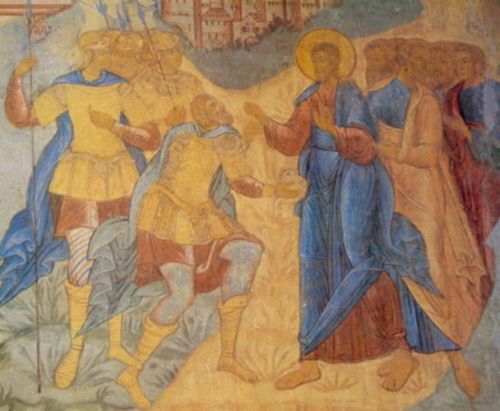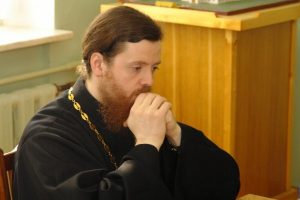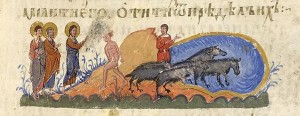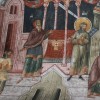The following sermon was delivered in 1978, when the fourth Sunday after Pentecost fell shortly after the feast day of Sts. Peter and Paul. Fr. Vsevolod’s comments regarding the Apostles’ Fast nonetheless remain valuable to those still observing the fast.
In the Name of the Father, and of the Son, and of the Holy Spirit!
The Church has just celebrated the feast day of Sts. Peter and Paul, Chiefs among the Apostles. The Apostles’ Fast that preceded this feast has also gone by. If asked how we spent the fast, the majority of us would likely reply to this question very simply: “somehow or other.” We might also add: “the same way we now normally spend the fast.” This, brothers and sisters, is because we now hold many incorrect views about the fast. People think that fasting is primarily a specific diet. And this diet is frequently difficult to follow due to circumstances beyond our control, so we spend it “somehow or other.” But fasting is in fact something completely different; it is by no means a diet.
The Christian life, the life of a believer, is one of movement. What kind of movement? It is movement from the terrible bondage in which we all live to freedom. The life of a believer is filled with thirst for this freedom. This movement freeing us from bondage to freedom is itself the Christian life. Freedom from our passions, from those inner enemies that fight and coerce us every minute… But do we manage to accomplish anything in this movement? Are we in fact moving forward and upward, freeing ourselves from our passions and from our inner enemies? The fast is nothing other than a speeding up of this movement, a new rhythm. This movement from bondage to freedom is more intensive during the fast.
However, were one to ask even those believers who went to Confession and communed of the Holy Gifts during this fast: “Well, have you become any freer? Have you advanced far along this path? Or not?” Were one to pose the question this way, it is unlikely that even those who have had Confession and Holy Communion would reply: “Yes, I’ve become much freer; I’ve moved forward. Life has become easier and better.” People rarely reply to this question this way because they do not even know how to confess properly. What is Confession? Translated from the Greek, it would mean “change”: change of mind; a complete alteration of all feelings, all desires, and all concepts we have in our minds. That is Confession. When going to Confession, do we think about what should now take place? Are we prepared for this, for a complete inner change? “I will now alter my entire being; above all, my mind will be completely changed.” Very few people think this way, brothers and sisters. But this is true Confession. One needs to alter one’s entire being, to show willingness for such alteration, to make efforts towards such alteration, and to apply one’s will for such change. This is true Confession, and it is saving. This is true repentance. Repent ye: for the kingdom of heaven is at hand – this is how the preaching of the Gospel of the Lord Jesus Christ began. “Repent” means to change: to change one’s entire being, one’s entire nature, to change everything within! I repeat: alter all your feelings, all your desires, and all your concepts – and then you will achieve freedom.
As you know from sacred history, the Jews were in terrible bondage in Egypt and then they went to the Promised Land. They had to go through the sea – and they walked through it as on dry land. They walked through the sea! We, too, live in terrible bondage – and we must leave behind this bondage. We, of course, face the same difficulties as did the Jewish people. We, too, need to walk through the sea and the desert, and only there – beyond the sea and the desert – does the Promised Land await us, which is freedom in God, freedom from the passions and their bondage, freedom from all attachments of the mind to everything here, everything earthly. In one of the canons the mind is therefore described as “weighed down by the earth” [zemlevesnyi]; it is always on earth, always attached to something earthly, to some thing, to some object, to something material, to the flesh in the broad sense of the word – the flesh of this world, of this existence – it is always attached to this. And these attachments of the mind to all things earthly form habits.
The change the Church speaks to us about, and which Christ requires of us (“repent!” means “change!”), is a rejection of all these awful habits. All habits are awful, because they attach the mind to something here. One needs to strive to give them up, to overcome them. There is a way! With the help of God’s grace – the very same grace that parted the sea before the fleeing Jewish people – we, too, will pass through these difficulties. But in order to do so, we need the resolve to go on.
St. Seraphim of Sarov was once asked: “Batiushka, why are there so many sinners among the faithful? Why do these sinners live such a pitiful life of constant inner, spiritual darkness?” (And, by the way, the majority of us live in such a state that our souls do not have too much brightness or joy, but much more darkness, gloom, sorrow, and sadness.) “Why do so many believers live such a life, while there are so few saints?” St. Seraphim of Sarov replied: “Because people have such little resolve.” This is the resolve to change of which we spoke. We only need one thing: resolve! “Lord, I want to change; I resolve to give up my habits, my thoughts, my concepts – even that which seems natural and totally certain, even such things do I resolve to abandon.” But we must be resolute – and then the power of God that parted the sea will remove from before us all the obstacles hindering our advancement along the path to deliverance from the bondage of the passions, moving us towards the Promised Land, towards deliverance from the bondage of sin, towards God, towards going out to meet God. God does not save us against our will. We only need to desire salvation, to show the resolve to take this path and, with God’s help, we will make progress along this path.
People tend to approach Confession in the same way that things happen in their lives: someone makes a mistake, does or says something wrong, and his conscience begins to bother him. So he apologizes and shows remorse for making the mistake. He experiences this remorse. Apologizing even makes him feel pleased with himself. He begins to grow fond of himself: “See what kind of person I am!” Nearly the same thing happens at Confession, in the Mystery of Repentance: “Excuse me, Lord, I did something wrong; I made a mistake. Sorry!” And the very same self-satisfaction arises: “See what kind of person I am! I admit my sin, I see it, and condemn it.” And he remains in these feelings, in these emotions. Does this experience change him? No, not at all! Just as he was before Confession, so he remains afterwards. Nothing in him has changed. Therefore the darkness in which he lives, with his mind “weighed down by the earth,” stays in his soul. Therefore he has little joy. But it seems that he has fulfilled the law…
Those of you who read the daily Gospel and Epistle readings during the final days of the Apostles’ Fast will certainly remember what the Apostle Paul says in the Epistle to the Romans about the relationship of church law, the law of faith, and faith itself. The Apostle Paul reminds us of what the Prophet Moses already taught: that the fulfillment of all the requirements established by church law certainly helps deliver us from the bondage of sin – but there still remains justification by faith, and it in this that we should primarily place our hope.
In his Epistle to the Romans, the Apostle Paul says that among the Gentiles and unbelievers are many more people than we might think about whom we could say: “The faith that we preach is close to your heart!” [cf. Romans 10:8]. And he is speaking about pagans!
Today you heard the Gospel reading about a Gentile, the Roman centurion in Capernaum, who so believed in Christ that He, turning to the crowd that surrounded Him, said: “Verily I say unto you, I have not found such faith in Israel!” [cf. Matthew 8:10]. We live in a society that is non-believing; the overwhelming majority of people who live around us are non-believers. Alas, we often inwardly extol ourselves above them: “See, I’m not like them, I believe in Thee, God, and I even fulfill the requirements of church law: I don’t eat such-and-such, and instead I eat such-and-such” and so on. Meanwhile, are you sure that Christ might not turn to one of those atheists or non-believers who live around you and say: “I have not found such faith among believers as I see has been given to you”?
One certainly needs to treat with great respect everything that is required by church law in the arrangement of our lives, because these laws and requirements naturally facilitate our path towards deliverance from the passions. But we need to place more hope in the power of faith, in the same way that the centurion in Capernaum had faith. When we have proper faith, fulfillment of the law will be saving for us. Otherwise – and today’s Gospel reading speaks of this – we will be found among the children of the kingdom cast into outer darkness, where there will be weeping and gnashing of teeth, which is so familiar to us from our own lives [cf. Matthew 8:12]. Let us think about this, brothers and sisters, and let us strive – more often, and better, and harder – to have this joy, to strive to have faith that is full of humility and love for Christ, faith that will surely bring with it joy and the fulfillment of all our needs, as well as the healing of soul and body, as with the sick servant for whom the centurion in Capernaum interceded. Amen.
Translated from the Russian.





















